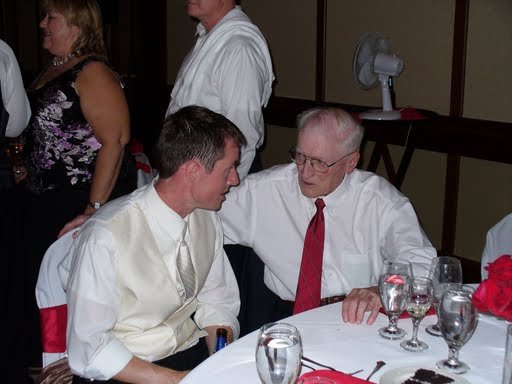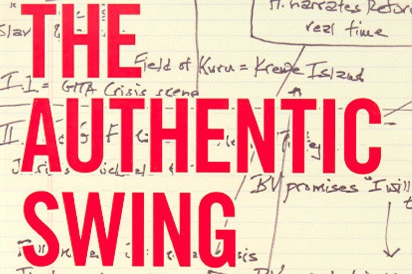When my grandfather returned home from Europe after World War II, he headed back to the golf course.
Growing up during the Great Depression, he spent a lot of time as a volunteer caddie trying to make a little money. He didn’t get paid for it, but he made a little money in tips. He got up early–earlier than the other kids–to make sure he got picked by the members of the country club. “There would be 200 guys lined up waiting there,” he told me. Getting up earlier than the older guys was the only way he had a chance to make any money.
Eventually, he worked his way up to the pro shop.
You have to wonder what his friends thought when he got back from the war. “Yeah, Joe, you’re good, but it’s just a game. Time to face reality. Go get a real job.”
He made a career out of it becoming a golf pro at a series of clubs in the Cleveland area and then settling down in Sandusky, Ohio as the head pro of the local country club. Years later he became a rules official for the Northern Ohio PGA and was later inducted into their PGA hall of fame when I was still a kid.
I never saw him swing a club.
He had arthritis so bad, his hands would swell up for days if he tried to grip, let alone swing, a golf club. It must have been torture, not being able to play the game he’d dedicated his life to playing. Then, as a pro, to teach others without being able to show them what to do? It must have been overwhelming.
I never heard him complain.
Sometimes, it takes losing everything we rely on in order to find our true strength and purpose. Grandpa Joe was an excellent teacher of the game and a legend in every Ohio pro shop I’ve visited. He was known across the country for his knowledge of the game. He was so well respected as an expert that rules officials would call him on a Sunday afternoon in the middle of a tournament to get confirmation on a ruling they were about to make.
Finding Your Authentic Swing
“The search for the Authentic Swing [Bagger Vance continues] is a parallel to the search for the Self. We as golfers pursue that elusive essence our entire lives. What hooks us about the game is it gives us glimpses. Glimpses of our Authentic Swing, like a mystic being granted a vision of the face of God.
Stephen Pressfield, The Legend of Bagger Vance
Stephen Pressfield, author of The Legend of Bagger Vance and the The War of Art, wrote a book about golfers and writers called The Authentic Swing. I feel like he wrote it for me.
As I read it, I can’t help but think back to the advice I heard from Grandpa Joe over and over again. It’s the same philosophy, I think, Pressfield communicates through both Bagger Vance and The Authentic Swing.
Grandpa always had a way of making you feel like a pro at the end of a golf lesson.
He would watch and wait for the first five minutes, not saying a word. Then, he’d pick something. One thing for you to work on. Just one. It was simple and effective.
As far as I can tell, he was such an excellent golf pro because he knew the game had so little to do with talent and strength and everything to do with mindset. He turned novices into life-long golfers and lovers of the game throughout his whole life.
What was his secret to getting better at the game?
Focus on just one thing. Don’t over-think it.
One day it might have been my grip. The next lesson might be my hips or my feet or how I approached the ball. Then stance, then grip again, then stance once more. He always made the game so simple. He never got in your head. You never found yourself over-thinking things because you were so focused on mastering that one skill.
He never validated the results. Hit a bad shot? “Step up there and hit another one.” Hit a good shot? “What are you doing staring at it? Go hit another one.”
He was always the guide, never the commander. If something worked, “Keep doing it, Jared.”
That was the other part of his genius guidance. He never tried to form your swing into something it was not. He never compared you to another golfer. Each of us has our own swing and he helped his students find it. You never felt guilty about your swing, no matter how horrible it was.
This all fits so well with what Pressfield calls the search for the Authentic Swing, which is why I can’t help but think of those lessons on the driving range as I read the book.
Do it your way.
Don’t swing Rory’s swing, or Bubba’s, or, for heaven’s sake, Jim Furyk’s. Listen to Bagger.
Swing your Authentic Swing.Stephen Pressfield, The Authentic Swing
In The Legend of Bagger Vance, Pressfield’s main character, Junah, is searching for his lost swing and the mystical Bagger Vance is helping him remember it. The key to finding that swing required Junah to lose his hold on almost everything he thought he could rely on. Once Junah let go and stopped trying to force it, the swing returned.
Let the Club Do the Work
I may be mixing metaphors here, but the one piece of advice I can vividly hear my grandfather telling me again and again is:
“Let the club do the work.”
When most of us start playing the game of golf, we assume that the best way to make the ball go far is to hit it with everything we’ve got. Crush it. Hit it hard because, hey, Tiger can do it, right?
Not so.
Let the club do the work. That’s how you hit the ball long and straight. Don’t force it. Let it happen.
It’s an odd piece of advice, isn’t it? You wouldn’t tell a quarterback after he missed his receiver to “let the ball do the work.” You wouldn’t suggest that a pitcher let the ball throw itself, would you?
But in the game of golf it makes a lot of sense. The harder you try to swing, the worse that swing gets and the sloppier you play. It’s just one of the things that makes golf so unique.
There’s an incredible lesson about life there. The funny thing is, I’m about as good as living it out in real life as I am at playing golf.
Most of us, like the golfer, start out thinking it’s all about us. We assume the best way to live a successful life is to take control and do it ourselves. Work hard. Get the education. Get the job. Get that money in the bank. Save for our kid’s college. Save for our retirement. Get the promotion. We do everything we can to get our lives under control.
I don’t know about you, but I don’t know anyone who has got it all put together.
Sometimes we have to let go of the need for control and comfort and live life the way we’re meant to live, swing our Authentic Swing.
Go back to the pro shop rather than getting a real job.
Teach a game you’re body won’t let you play.
Let the club do the work.
If I’m right and this is a true lesson for life, then we have to lose our reliance on everything we’ve built up for ourselves: our educations, our careers, our experience, our goals, our bank accounts, our relationships. We’ve got to lose our attachment and trust we’ve built into all of those things because in life and golf they just don’t count for much.
The golfer can’t find his swing by forcing it.
Neither can the writer. The writer finds his voice by getting out of the way, by letting the story write itself. By letting the club do the work. As Pressfield says, she listens to the Muse.
The same goes for us all no matter what we do. Creativity comes from the Creator. We can’t force a life we weren’t meant to have through our hard work alone. Sometime we can swing with everything we’ve got and hit a fairway, but hit two and a row and you’re just blessed.
The life we’re meant to live is already there. Like a swing, long forgotten, you just need to get out of the way and let The Authentic Swing show itself. Like the club, it’s just waiting for you to swing it and see what happens. It’s waiting for you to pick it up, swing it, and let it take care of the rest.
How do you find your purpose in life? It’s not about you. Let God do the work.
(Happy birthday Grandpa. I miss you.)




